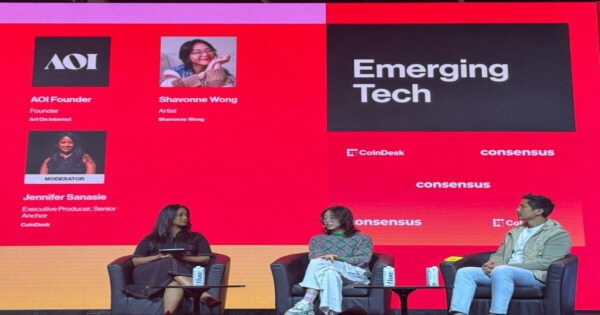Khushi v Rangdhol
April 2, 2025 18:05
AI and blockchain converge, enabling decentralized data ownership and real-time integration for better predictions.
Consensus Hong Kong In 2025, one of the most fascinating discussions revolved around the growing convergence of artificial intelligence (AI) and blockchain technology. Numbers from key industries, including Clara Tsao (Filecoin Foundation, Filecoin Foundation), Jing Sun (Co-Founder, IoTex & Machinefi Lab), and Mark Rydon (Co-Founder, Aethir), delve into how decentralized technology can democratize AI and address the issues of centralized data management.
Decentralized AI and data ownership
Clara Tzao explored the geopolitical aspects of AI rise, noting that global powers like the US and China are fighting for leadership in AI races. “Reliance is a major concern when it comes to data use,” Tsao said, highlighting the growing need for data ownership. She argued that “decentralized AI, where users control where data is stored and how it is used, is essential to address these concerns.” By leveraging the decentralized AI model, which is blockchain transparency and security, users can maintain control over their data and solve the privacy and ethical dilemmas common to centralized systems.
Distributed infrastructure: Cloud computing by people for people
The highlight of Consensus HK 2025 was the announcement of Aethir’s distributed cloud infrastructure. This distributed system allows developers to access the GPU resources needed for AI workloads and democratize access to high-performance computing without the large capital investment.
“We are building a decentralized cloud infrastructure that democratizes access to GPU resources,” says Markrydon. Aethir’s platform utilizes a considerable number of Nvidia H100 GPUs to provide AI startups with scalable and affordable projects.
Real-time data: IoT-Blockchain integration
Another important trend in meetings is the integration of real-time data into blockchain systems, a key component of supplying current information to AI models. Jing Sun from Iotex explained how IoT devices are becoming increasingly important in providing real-time data.
“Distributed networks are exploring ways to deliver real-time data to AI models from weather stations, flight trackers and IoT devices,” Sun said. This integration improves the ability to make accurate AI predictions and automate responses in real time. For example, weather sensors can trigger automatic insurance payments based on incoming data, demonstrating how blockchain can bring transparency to AI applications.
Future: Decentralized AI agents and the rise of autonomous economies
The most visionary debate at Consensus HK 2025 focused on the role of AI agents carrying out transactions in blockchain networks, interacting autonomously with each other. Panelists predicted that AI agents could ultimately carry out more transactions in chains than humans. This shift from AI to AI to commercial transactions illustrates the groundbreaking development of blockchain and AI integration. These agents can make decisions, collaborate, and execute transactions autonomously, paving the way for a future where AI systems take on complex tasks in industries such as finance and transportation.
The possibility that decentralized computing and AI will reshape the digital economy is immeasurable. By integrating these technologies, we have a future within reach where individuals and businesses can safely access AI capabilities without relying on centralized, high-tech giants. This convergence promises a new era of AI transparency, trust and accessibility.
Image source: ShutterStock




